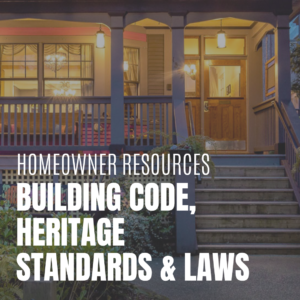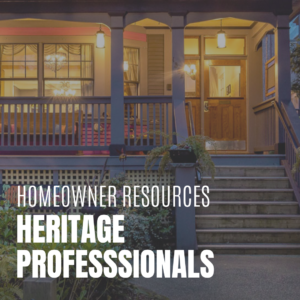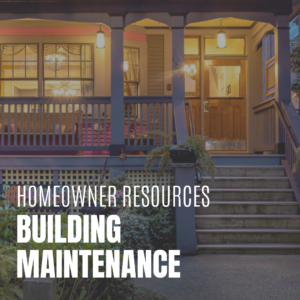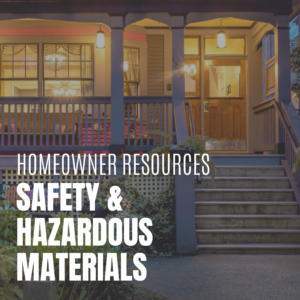- Heritage 101
- Advocacy
- Accessibility for Historic Places
- Climate & Sustainability
- Cultural Maps
- Heritage Place Conservation
- Heritage Policy & Legislation
- Homeowners
- Intangible Cultural Heritage
- Reconciliation
- Indigenous Cultural Heritage
- Setting the Bar: A Reconciliation Guide for Heritage
- 1. Heritage and Reconciliation Pledge
- 2. Acknowledging Land and People
- 3. Celebrating Days of Recognition and Commemoration
- 4. With a Commitment to Learn
- 5. Committing to Strategic Organizational Diversity
- 6. Mission-Making Room for Reconciliation
- 7. Possession, Interpretation, Repatriation and Cultural Care
- 8. Shared Decision Making
- 9. Statements of Significance and other heritage planning documents
- 10. Heritage Conservation Tools, Local Government Act
- Racism: Do Not Let the Forgetting Prevail
- Taking Action: resources for diversity and inclusion
- Webinars On-Demand
Homeowner Resources : Heritage Designation
Why it matters:
Heritage Designation is a formal recognition of the historical importance of your house or property. While Provincial and National Governments both play a role in Heritage Designation, your local government is the most common point of contact regarding heritage status. Whether you own a designated house, or you want to get your property designated, it is important to learn what impact designation can have on your property.
Potential impacts of designation
- Official recognition and documentation of the historic value of your property
- Opportunity to research and learn more about the history of your property
- Legal protection of character-defining elements of the building, and against future demolition
- Flexibility within the BC building code to use Alternative Compliance Measures for Heritage Buildings
- Regulation under by-laws that inform what changes or updates you can make to the building
- Some local governments offer financial incentives and funding to heritage registered and/or designated properties
Your local government is responsible for establishing the heritage programs that affect you as a homeowner. Along with Heritage Designation, HRAs and Section 219 covenants, there are a number of ways that your government might protect heritage resources, including Temporary Protection Orders for properties recognized to have heritage value (such as those listed on a Heritage Register or Inventory) and Heritage Conservation Areas. They may have no formal heritage program in place, opting to designate on a case-by-case basis.
Contact your local government to learn about what they are doing to protect local heritage resources.
Resources
» BC Register of Historic Places (BCRHP)
» Quick Study: Heritage Designation
» Quick Study: Heritage Registers
» Make the case for Heritage Designation : Guidelines for Writing a Statement of Significance
» Heritage Designation and Property Values – Is There an Effect?
FAQ
How can I advocate for the conservation of heritage neighbourhoods?
Heritage neighbourhoods are protected using Heritage Conservation Areas (HCAs). HCAs are created at a municipal level through your local government’s planning department. You can learn more about the common characteristics of a Heritage Conservation Area in our resource guide. Contact your local government if you believe they could have a role in your community’s heritage conservation.
How can I get my home designated?
You are able to advocate for the potential listing or designating of your heritage home. This does not guarantee it will be added to the local register or be designated, as there can be many steps towards this end goal. Often, a heritage home with the potential for designation requires some work done by a heritage planner to deem if the home has heritage significance. That is not to say that homeowners shouldn’t try! Different municipalities follow different steps for designation, so contact your local government to learn about their process for designating your property, and the benefits of doing so.
For more information on designation and registers, we invite you to explore the two Quick Study guides list below: “Heritage Designation” and “Heritage Registers.”
How can I best recognize the heritage significance of my home?
You don’t have to have heritage designation for your home to be recognized for his heritage significance. Identifying the heritage value of your home starts with you. Researching and writing a Statement of Significance (SoS) is an important first step that you can take before getting in contact with your local government. Generally, SoS’s are used to explain a property’s heritage value and justify its preservation. They make a case for a property’s heritage value. An SoS will identify what parts of your house must be preserved by helping you identify its heritage value and character-defining elements. It can help you to secure heritage designation or get your home added to a heritage register in the future.
This BC Heritage Branch document breaks down how to write an SoS, including suggestions for identifying Heritage Value and Character-defining elements. You can write your own SoS, but you may want to seek professional help to do so. You can learn more about people who do this kind of work on our Heritage Professionals page. but your local museum or municipality may know of heritage consultants you can hire to help. Or you can contact Heritage BC and we may be able to direct you to someone.
What changes can or cannot be made if my home is designated?
The answer to this question is decided at a municipal level. Contact your local government to learn what by-laws regulate the restoration and renovation of your heritage designated home.
What is the difference between Heritage Designation and Heritage Registers
The one thing that generally differentiates Heritage Designation and Heritage Registries is that designation is accompanied by locally written bylaws, which often require that owners of designated properties follow regulations when modifying their properties. Registries, on the other hand, are used for documentation purposes above all else, and are not accompanied by any legal structure to protect the building or its character defining features.
Other distinguishing features between heritage designation and heritage registers are determined on a local level. Both the power to designate heritage and to create heritage registers is available to local governments under the Local Government Act and the Vancouver Charter. Visit your local government’s website, or contact them directly, to learn about their different heritage programs.
How can I remove designation from my property
We encourage you to consider the value that your heritage property brings to your local community, and to learn about the history of the building. Do you really want to remove it from designation? Once a heritage property is lost, it cannot be returned.
If you decide that you want to pursue de-designation, know that it is very rare. A designated property has likely been assessed by a professional through in depth research about the historical context and heritage value of your property. Most de-designation processes will require you to demonstrate that the property does not have the heritage value previously established. An assessment by a Heritage Professional could determine that your property is not of significant heritage value, but this cannot be guaranteed.
A good first step is to contact your local government directly to learn talk about their process.








